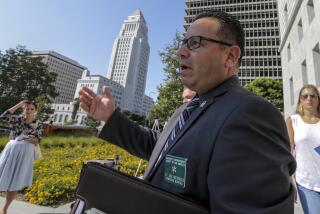Sheriff of Nottingham, Robin Hood’s Old Foe, Preserves the Legend
- Share via
NOTTINGHAM, England — The sheriff of Nottingham speaks in a melodic West Indian voice and has only nice things to say about his archenemy Robin Hood, who is still bringing in the cash.
“He was a socialist because he always thought about the poor people, and he used to rob the rich for the poor,” the admiring sheriff said in his office overlooking Nottingham’s main square.
The words don’t seem strange from the legendary outlaw’s foe. Sheriff Tony Robinson, Jamaican-born and the first black to hold the 1,000-year-old office, is a Labor Party town councilor and veteran trade union activist.
Instead of chasing bands of merry men in Sherwood Forest, the sheriff of Nottingham is charged with attracting tourists to this central English city of 250,000 where Robin Hood is big business.
“The sheriff in the old days used to be a bad man. But I have to show that I am a peaceful sheriff and a good sheriff,” says the 68-year-old retired bus driver and father of seven.
“I’m not a gunslinger,” he adds, noting that many people still associate his title with the American Wild West.
Nottingham is one of only 16 British areas that have not abolished the honorary office.
Since Robinson’s appointment to the one-year post by the City Council earlier this year, he has gone on a promotional tour of West Germany and plans to visit the United States and Canada.
Last year, about 600,000 tourists visited Nottingham and surrounding Nottinghamshire, whose attractions include Sherwood Forest with the Robin Hood Center, which gives a history of the area and its most famous outlaw, and the Major Oak, where legend has it he hid from the sheriff.
“I want to see if I can bring in three times, four times that amount into the city,” Robinson said.
When he is not out promoting his town, the sheriff visits homes for the elderly, meets schoolchildren and hands out bouquets to couples celebrating their golden or diamond anniversaries.
Historians have often questioned whether Robin Hood, Friar Tuck, Little John and Maid Marian ever existed. Only a year ago, even Nottingham Council shot an arrow at the legend that had been enriching its coffers.
It issued a leaflet claiming that Robin Hood, far from being a romantic rogue, was just a plain medieval forester.
But the leaflet was short-lived.
A new one, headlined “The Legend of Robin Hood,” states matter-of-factly that “Robin Hood lived in Sherwood Forest in the Middle Ages and was the world’s most famous outlaw.”
Robinson is a believer.
“Men just don’t get up and write stories like that . . . there must be some link (to fact),” he says.
Robin Hood is the bowman hero of English ballads, some dating from at least the 14th Century. Many of the tales portray the outlaw and his band robbing and killing representatives of authority.
The sheriff of Nottingham--the town has had such a law officer since the 10th Century--was his sworn enemy, representing the king and levying crown taxes.
The office is now ceremonial, and responsibility for the local judiciary rests with an official called the high sheriff.
Historians note that Robin Hood ballads were the poetic expression of popular aspirations in England at a time of agrarian discontent.
Hollywood took a more romantic perspective, casting Douglas Fairbanks and Errol Flynn as the feather-capped outlaw in tights. Disney opted for a cartoon fox.
For Robinson, the role of sheriff, replete with ceremonial chains, maces and robes, brings great personal satisfaction.
When he arrived in Nottingham 29 years ago, he said, blacks faced some of the worst discrimination in Britain.
“Nottingham was one of the most racist towns,” Robinson said. “When black people used to come, they had difficulty with housing, jobs (and) they were offered the worst kind of everything.”
Living in a one-room flat, he found a larger home, only to have his neighbor erect a wall between their houses when he saw a black man move in.
Wearing his gold chain of office, Robinson said, “Discrimination won’t die out completely, but we’ve come a long way.”
More to Read
Sign up for Essential California
The most important California stories and recommendations in your inbox every morning.
You may occasionally receive promotional content from the Los Angeles Times.













